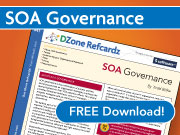 Gartner EA Summit: Effective Governance, Best Practices
Gartner EA Summit: Effective Governance, Best Practices
Presenter: Scott Bittler, Gartner
This presentation got me on my soap box. This talk took the traditional approach to governance, framing it around decision rights. In my opinion, this is too narrow of a scope and leads to the typical review board approach that contributes to the negative connotation most project staff have around governance. A focus on decision rights always jumps to some kind of an exception process, or better stated, a situation where there is a project that is not compliant with the architecture. The problem I have with this view is that these decisions assume that the project was knowingly out of compliance. More often than not, I don’t think that’s the case. I think the project team isn’t aware of what “in compliance” is, makes decisions based upon their knowledge and context, and only when (and if) someone else who has some other context comes into the picture, does a discussion around “decision rights” even enter the mix. When that happens, it’s usually too late in the project, and the schedule wins. What’s the real source of the problem here? It’s not a problem with decision rights, it’s a problem with not providing the people making the decisions the knowledge they need to do it right. What’s even worse in that if we didn’t even find out about the non-compliance, the focus is misplaced on inserting a checkpoint/review instead of actually getting the project team to make the right decision to begin with.
Put another way, how fast would you drive on a road that has no speed limit signs posted? If everyone was speeding, is the right answer to put police officers out there every mile, or is the right answer to post speed limit signs. Unfortunately, with projects, we’re doing the former. We stick more police out in the form of big review boards, but we still haven’t bothered to give the teams the information they need to do things right.
Instead of focusing on who has authority, focus on what the policies are that state what the “right” thing to do is, and enable the people that are must make the decisions to make them properly, rather than taking away their ability to make decisions by requiring them to guess which decisions must be escalated up the ladder to the person who is deemed the authority. The person who is the authority shouldn’t be making decisions, they should be making policies and enabling the decision makers.
The session is now over, and I want to point out that his recommendations slide did have a bullet point encouraging lots of proactive communication on the architecture. I also want to add that there was good content in the presentation, especially the brief discussion on federated governance across business units near the end, I just wish he had emphasized his recommendation on proactive communication (and introduced the concept of policy as part of that) in the earlier slides instead of so much focus on review boards and waivers. I caught him after the presentation and told him about my book, hopefully we can continue the conversation. He’s not on Gartner’s blogroll yet, so I’ll have to hope for some offline communication on the topic.

Todd,
Your police analogy was spot on. I think it holds true regardless of the size of the organization as well. Most would assume the larger the organization the more important it is to have those well understood policies in place. It’s also important in smaller orgs as well where dual roles are frequent and the ability/time to police is not there.
markg
http://www.thegreylines.net
Thanks for this Todd. For me there are a couple of overlapping issues:
Do project boards actually know what they are established for? Plus, how well trained are members of project boards? I have to say that my experience here in the UK is that Boards are established sometimes with (overly) large numbers, give little guidance and are not well trained in understanding what they are to do and in project management. They usually receive the thumbs down from project managers who say they add little or no value.
Yes, they should set the parameters of decision making and enable others to make decisions. If I was to ask everyone who came through courses we ran in 2008 very few would say that this had actually happened.
Keep up the good work
Ron Rosenhead
http://www.ronrosenhead.co.uk
[…] response to my post on the “Effective Governance” talk given at the Gartner EA Summit, Ron Rosenhead said: For me there are a couple of overlapping […]